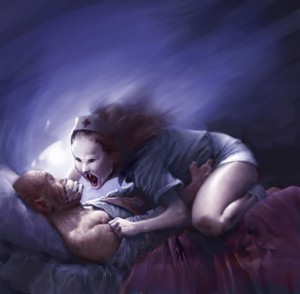-
A Closer Look at Sleep Paralysis
Saturday, July 5th, 2025by Dr. Gregory Brown
There are a multitude of sleeping disorders that are known to afflict people in this day and age. One rare and unusual variety of sleep disorder is called sleep paralysis.
 This little-known and many times misunderstood problem can cause great confusion among its sufferers. People who experience periodic and often frightening episodes of sleep paralysis are often desperate for a cure.
This little-known and many times misunderstood problem can cause great confusion among its sufferers. People who experience periodic and often frightening episodes of sleep paralysis are often desperate for a cure. Sleep paralysis forums are full of people seeking answers and reading about the sleep paralysis stories of others. This lack of understanding has led some people to believe that their bodies have been taken over by evil spirits, when the true cause is connected to the body’s REM sleep patterns.
Paralysis while asleep is still not well-understood and remains something of a mystery to doctors and researchers. Its occurrences and symptoms range from mildly irritating to bizarre and terrifying. Sufferers need to know that sleep paralysis can be a genuine medical problem and that they are not alone.
Superstitions and lack of understanding about this affliction have persisted for centuries. Witches were once thought to inhabit homes, and thus sleep paralysis was called “the old hag.” This is because it was believed that the witch paralyzed her victims by sitting on their chests as they lay in bed.
Why Sleep Paralysis Occurs
The body’s occasional unresponsiveness to waking up is what lies at the root of this phenomenon. When a person falls asleep, the human body will basically paralyze itself in order to prevent injury while asleep. This is because if a person were to physically act out their dreams, chaos could result.
Sleep paralysis usually occurs either while you are falling asleep (called hypnagogic or predormital sleep paralysis), or it happens as you are waking up (known as hypnopompic or postdormital sleep paralysis).
Sleep researchers believe that in the majority of cases, sleep paralysis is a sign that your body is not proceeding smoothly through the stages of sleep. The good news is that sleep paralysis is rarely linked to deeper psychological problems.
As much as 40% of the population may experience sleep paralysis. This common sleep disorder often first appears in the teenage years. But individuals of any age can experience it.
Factors that may contribute to sleep paralysis include a lack of sleep, a rotating sleep schedule, stress or bipolar disorders, sleeping on one’s back, the use of certain medications, substance abuse, and related sleep problems like narcolepsy or leg cramps.
What Sleep Paralysis Feels Like
In the case of sleep paralysis, an individual wakes up, but their body remains paralyzed. This inability to move can last for several seconds to as long as several minutes, and can be genuinely terrifying.
The perplexing thing about not being able to move while asleep is that many sufferers experience vivid hallucinations during these short periods of paralysis. Life-like apparitions can appear in various forms and manifestations. Many times, a dark and shadowy figure emerges who then sits on top of the person or stares at them from across the room.
These often bizarre and terrifying hallucinations are, strangely enough, considered normal. While some have connected these episodes to sickness or even demonic possession, the true reasons for these vivid hallucinations can be explained by doctors and researchers.
Treatments for Sleep Paralysis
There are many methods to deal with this problem, and if the symptoms persist, it may be best to consult with a medical doctor. Fortunately, episodes of sleep paralysis happen only occasionally and are mostly harmless.
The majority of individuals do not need treatment for sleep paralysis. For people suffering from occasional sleep paralysis, there are simple steps that can be taken at home to manage this disorder. First and foremost, make sure you get enough sleep each night.
If you are feeling stressed, do what you can to relieve it before bedtime through relaxation techniques. New and different sleeping positions may also help, for example sleeping on your side instead of your back.
However, if symptoms persist, be sure to see your doctor. He or she may be able to help you deal with any physical or mental health problems contributing to sleep paralysis.
Related sleep disorders, such as narcolepsy or leg cramps, must be overcome in order to ensure a more restful sleep. Doctor-prescribed antidepressant medication may also be used to help regulate sleep cycles.
Occurrences of sleep paralysis can still be very frightening, and in rare cases can leave lasting trauma on the victim. This is true especially if the afflicted person doesn’t have any idea what is happening to them, and undergoes bizarre hallucinations while temporarily paralyzed.
At the end of the day, it is wise to consult with a professional doctor concerning how to deal with sleep paralysis. It may provide sufferers some solace to know that this affliction is considered normal and that sleep paralysis symptoms appear in many people on an occasional basis.
(published January 2, 2011)


